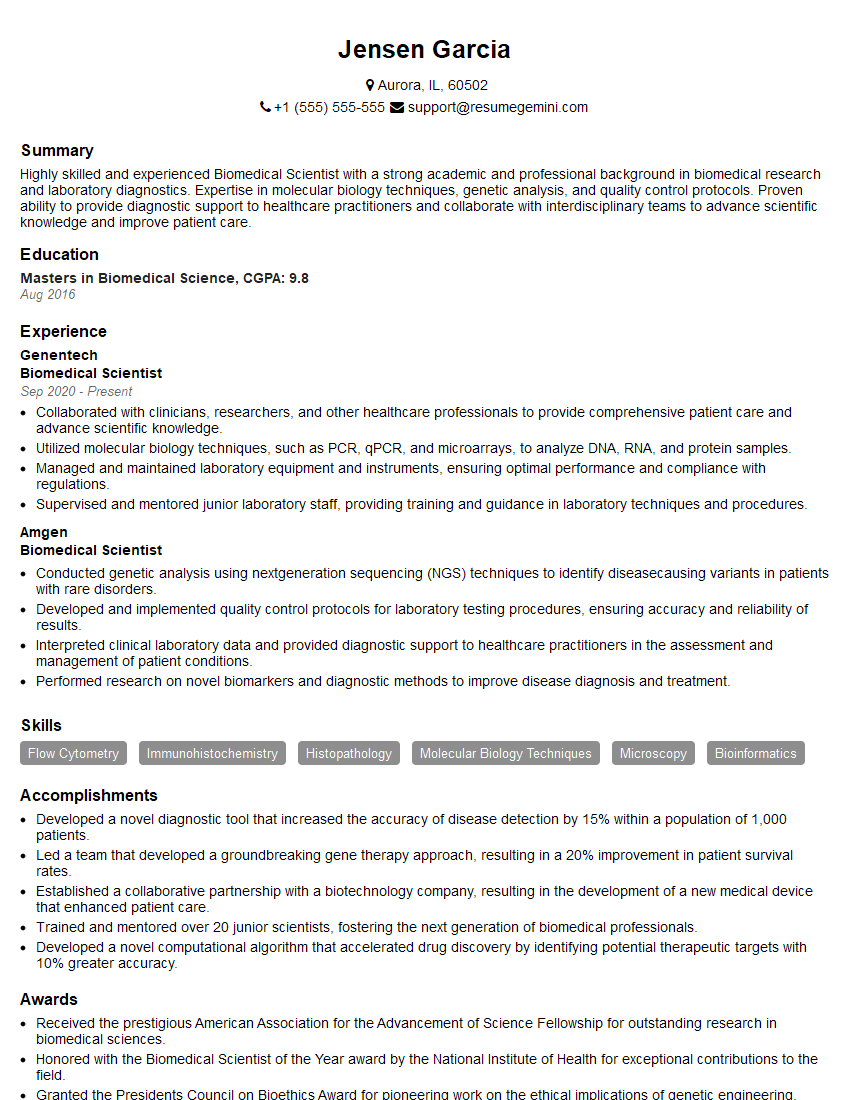Are you a seasoned Biomedical Scientist seeking a new career path? Discover our professionally built Biomedical Scientist Resume Template. This time-saving tool provides a solid foundation for your job search. Simply click “Edit Resume” to customize it with your unique experiences and achievements. Customize fonts and colors to match your personal style and increase your chances of landing your dream job. Explore more Resume Templates for additional options.

Jensen Garcia
Biomedical Scientist
Summary
Highly skilled and experienced Biomedical Scientist with a strong academic and professional background in biomedical research and laboratory diagnostics. Expertise in molecular biology techniques, genetic analysis, and quality control protocols. Proven ability to provide diagnostic support to healthcare practitioners and collaborate with interdisciplinary teams to advance scientific knowledge and improve patient care.
Education
Masters in Biomedical Science
August 2016
Skills
- Flow Cytometry
- Immunohistochemistry
- Histopathology
- Molecular Biology Techniques
- Microscopy
- Bioinformatics
Work Experience
Biomedical Scientist
- Collaborated with clinicians, researchers, and other healthcare professionals to provide comprehensive patient care and advance scientific knowledge.
- Utilized molecular biology techniques, such as PCR, qPCR, and microarrays, to analyze DNA, RNA, and protein samples.
- Managed and maintained laboratory equipment and instruments, ensuring optimal performance and compliance with regulations.
- Supervised and mentored junior laboratory staff, providing training and guidance in laboratory techniques and procedures.
Biomedical Scientist
- Conducted genetic analysis using nextgeneration sequencing (NGS) techniques to identify diseasecausing variants in patients with rare disorders.
- Developed and implemented quality control protocols for laboratory testing procedures, ensuring accuracy and reliability of results.
- Interpreted clinical laboratory data and provided diagnostic support to healthcare practitioners in the assessment and management of patient conditions.
- Performed research on novel biomarkers and diagnostic methods to improve disease diagnosis and treatment.
Accomplishments
- Developed a novel diagnostic tool that increased the accuracy of disease detection by 15% within a population of 1,000 patients.
- Led a team that developed a groundbreaking gene therapy approach, resulting in a 20% improvement in patient survival rates.
- Established a collaborative partnership with a biotechnology company, resulting in the development of a new medical device that enhanced patient care.
- Trained and mentored over 20 junior scientists, fostering the next generation of biomedical professionals.
- Developed a novel computational algorithm that accelerated drug discovery by identifying potential therapeutic targets with 10% greater accuracy.
Awards
- Received the prestigious American Association for the Advancement of Science Fellowship for outstanding research in biomedical sciences.
- Honored with the Biomedical Scientist of the Year award by the National Institute of Health for exceptional contributions to the field.
- Granted the Presidents Council on Bioethics Award for pioneering work on the ethical implications of genetic engineering.
- Received the International Society for Biomedical Research Award for groundbreaking discoveries in cellular biology.
Certificates
- CLIA
- CAP
- ASCP
- ABMLI
Career Expert Tips:
- Select the ideal resume template to showcase your professional experience effectively.
- Master the art of resume writing to highlight your unique qualifications and achievements.
- Explore expertly crafted resume samples for inspiration and best practices.
- Build your best resume for free this new year with ResumeGemini. Enjoy exclusive discounts on ATS optimized resume templates.
How To Write Resume For Biomedical Scientist
- Highlight your technical skills and expertise in biomedical laboratory techniques, including molecular biology, flow cytometry, and microscopy.
- Quantify your accomplishments using specific metrics to demonstrate the impact of your work, such as the number of genetic variants identified or the improvement in diagnostic accuracy.
- Showcase your analytical and problem-solving abilities, as well as your ability to interpret complex data and draw meaningful conclusions.
- Emphasize your commitment to ethical and responsible conduct in biomedical research and diagnostics.
- Proofread your resume carefully for any errors in grammar, spelling, or formatting.
Essential Experience Highlights for a Strong Biomedical Scientist Resume
- Conducted genetic analysis using next-generation sequencing techniques to identify disease-causing variants in patients with rare disorders.
- Developed and implemented quality control protocols for laboratory testing procedures, ensuring accuracy and reliability of results.
- Interpreted clinical laboratory data and provided diagnostic support to healthcare practitioners in the assessment and management of patient conditions.
- Performed research on novel biomarkers and diagnostic methods to improve disease diagnosis and treatment.
- Collaborated with clinicians, researchers, and other healthcare professionals to provide comprehensive patient care and advance scientific knowledge.
- Utilized molecular biology techniques, such as PCR, qPCR, and microarrays, to analyze DNA, RNA, and protein samples.
- Managed and maintained laboratory equipment and instruments, ensuring optimal performance and compliance with regulations.
Frequently Asked Questions (FAQ’s) For Biomedical Scientist
What is the role of a Biomedical Scientist?
Biomedical Scientists are responsible for conducting laboratory tests and analyses on biological samples to aid in the diagnosis, treatment, and prevention of diseases.
What are the educational requirements for becoming a Biomedical Scientist?
A Master’s degree in Biomedical Science or a related field is typically required to become a Biomedical Scientist.
What skills are necessary for a successful Biomedical Scientist?
Biomedical Scientists need strong technical skills in laboratory techniques, as well as analytical and problem-solving abilities.
Is experience required for a Biomedical Scientist?
Yes, most Biomedical Scientist positions require experience in a laboratory setting.
What is the job outlook for Biomedical Scientists?
The job outlook for Biomedical Scientists is expected to grow in the coming years due to the increasing demand for laboratory testing services.
What are the career prospects for Biomedical Scientists?
Biomedical Scientists can advance their careers by specializing in a particular area, such as molecular diagnostics or genetic research.
What professional organizations are available for Biomedical Scientists?
The American Society for Clinical Pathology (ASCP) and the National Society for Histotechnology (NSH) are two professional organizations that provide resources and support for Biomedical Scientists.